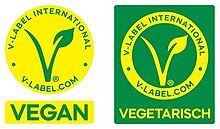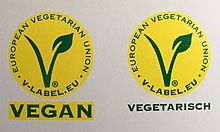European Vegetarian Union
 | |
| Abbreviation | EVU |
|---|---|
| Formation | 1988 |
| Founded at | Hilversum, Netherlands |
| Type | Non-profit organisation |
| Registration no. | 109356110578-03 |
| Focus | Vegetarianism/Veganism |
| Location |
|
Area served | Europe |
| Members | 43 member organisations from 28 countries[1] (2020) |
Official language | English |
General Secretary | Olivia Ladinig |
President | Felix Hnat |
Vice President | Sebastian Joy |
Treasurer | Johannes Gilli |
| Affiliations | |
| Budget | (2017) |
| Website | www |
| V-label | |
|---|---|
| Effective region | Worldwide |
| Effective since | 1995 |
| Product category | Food label |
| Legal status | Consumer recognised |
| Website | www.v-label.com |
The European Vegetarian Union (EVU) is a non-profit, non-governmental umbrella organisation for vegan and vegetarian societies and groups in Europe. The union works in the areas of vegetarianism, nutrition, health, consumer protection, climate and environment, and food labelling.
History
[edit]- The EVU distributed the 1995 film Devour the Earth about the global consequences of meat consumption. The film was produced by the Vegetarian Society, written by Tony Wardle and narrated by Paul McCartney.[2][3]
- In October 2011, Renato Pichler, Board Member of the EVU, reported that the French government's Décret 2011-1227 and associated Arrêté (September 30, 2011) effectively outlaws the serving of vegan meals at any public or private school in France. Similar decrees are proposed for kindergartens, hospitals, prisons and retirement homes.[4]
Purpose
[edit]The main activities of the EVU are:
- To support and represent member societies on a European level, and to offer a platform for close cooperation;
- To raise public awareness of, and promote vegetarianism, vegetarian/plant-based issues and the benefits of a vegetarian/plant-based lifestyle;
- To lobby governments, European institutions and organisations for greater recognition of plant-based issues in policy decisions; and
- To promote transparent food labelling in the interest of all vegetarian and vegan consumers across Europe and the rest of the world.
Labelling
[edit]

V-Label
[edit]EVU has acted as the background organisation for the V-Label in the past. Some of EVU's member organisations certify products with the label.[6] The label was launched in 1995[7] and redesigned in 2023 to better differentiate between the vegan and the vegetarian label.[5][8]
Other labels in the European Union
[edit]The European Vegetarian Union has tried to legally define the use of the labels "vegetarian" and "vegan" on food items.[9] They have argued that the vegan label on a product should have a clear and standard meaning. They have put forth two main requirements:
- "The deliberate use of non-vegan or non-vegetarian substances must be ruled out."
- "The (potential) presence of inadvertent traces of non-vegan or non-vegetarian substances should not be an obstacle to labelling a product as vegan or vegetarian, provided that such contamination occurs despite a careful production process that complies with the best practices and the state of the art."
Despite the organisation's efforts, the European Commission initially refused to enact any changes. The EVU has continued to lobby state governments, especially in Germany because the country experienced more widespread support for the labelling legislation. As a result, "consumer protection ministers of German Länder unanimously agreed on a proposal for a wording of the definition of the terms "vegan" and "vegetarian" for food labelling and put it into effect for the food control authorities within their jurisdictions, making it de facto binding."[9]
See also
[edit]- List of vegetarian organisations
- The Vegan Society (United Kingdom)
- Vegetarian Society (United Kingdom)
- Vegetarian and vegan symbolism
Animal protection movements
[edit]- Human Environment Animal Protection Party (Tierschutzpartei)
- Viva!
References
[edit]- ^ "Members - List". European Vegetarian Union. Retrieved 2020-01-21.
- ^ "Devour the Earth". World Preservation Foundation. Archived from the original on 2013-01-07.
- ^ "Devour the Earth". EVU. Archived from the original on 2013-10-14.
- ^ Renato Pichler "The French Government Outlaws Vegetarianism in Schools" Archived October 24, 2011, at the Wayback Machine, European Vegetarian Union (EVU). *Also see "The French Government Outlaws Vegetarianism in Schools", European Vegetarian and Animal News Alliance (EVANA).
- ^ a b "V-Label unveils new labels, marking global growth - V-Label". www.v-label.com. 2023-01-03. Retrieved 2023-04-19.
- ^ "Get certified - V-Label". www.v-label.com. 2022-05-30. Retrieved 2023-04-19.
- ^ "CH-440.4.021.134 V-Label GmbH". Archived from the original on 8 August 2015. Retrieved 24 August 2015.
- ^ "Mehr Transparenz: Neues V-Label markiert vegane und vegetarische Lebensmittel unterschiedlich". stern.de (in German). 12 January 2023. Retrieved 2023-04-19.
- ^ a b Domke, Felix (2018). "Vegetarian and Vegan Products - Labelling and Definitions". European Food and Feed Law Review. 13 (2): 102–107.
